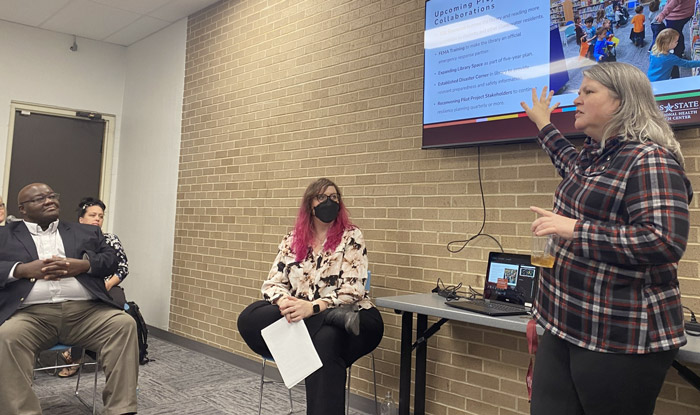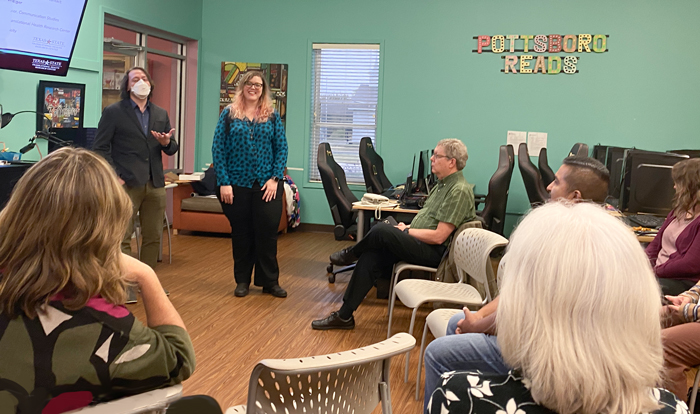Community Collaboration Adaptation of COPEWELL with Rural Texas Libraries
- Need: To help rural communities in Texas better prepare for disasters and emergency events.
- Intervention: A year-long pilot project used focus groups, a survey, and exit interviews to research a collaboration with librarians and local stakeholders to discuss a community's strengths and opportunities for resiliency planning.
- Results: Community stakeholders in Pottsboro and Gladewater collaborated to identify challenges to rural disaster preparedness like aging infrastructure and lack of communication with residents. They began the process to address these challenges through local resiliency planning and future programming.
Description
A research team led by Dr. Elizabeth K. Eger from Texas State University's Translational Health Research Center (THRC) used a community collaboration framework to adapt the COPEWELL (Composite of Post-Event Well-Being) framework, developed by an interdisciplinary research team at Johns Hopkins University. In this adaptation, THRC researchers partnered with the Texas State Library and Archives Commission (TSLAC) to recruit librarians and select two pilot sites in rural Texas. They trained local library directors to participate as conveners for the collaboration and to assemble community stakeholders to discuss resiliency planning.

The year-long pilot project involved the Lee-Bardwell Public Library in Gladewater and the Pottsboro Library in Pottsboro.
Services offered
The adaptation begins by training librarians as conveners to identify local stakeholders and to become collaboration facilitators.
After selecting stakeholders, the facilitators guide an open collaboration to discuss their community's strengths and challenges, their library's role in the community, and recent disaster events. The first collaboration meeting is used to select one COPEWELL rubric.
There are five COPEWELL self-assessment rubrics to choose from:
- Community Functioning: how goods and services are delivered to residents
- Prevention and Mitigation: pre- and post-disaster measures
- Ability to recover: the structural conditions that hinder residents' ability to recover after a disaster
- Social Capital and Cohesion: the factors that help a community function well
- Emergency Management: how risks and vulnerabilities are assessed and addressed
Then stakeholders complete a survey about one of the self-assessment topics to determine the community's highest needs. In the second group meeting, stakeholders discuss assessments about their community's resiliency and identify initial action steps for future resiliency planning and programs. Future collaboration meetings are recommended to sustain planning progress.

Results
The Pottsboro collaboration had 8 participants who discussed transportation, healthcare, affordable housing, broadband, workforce, and disaster events (especially when communications, electricity, or water supply is affected) as challenges to community resiliency. This group recommended continuing the meetings and improving communication with residents, which are being led by the library director. The meetings also led researchers to make recommendations such as applying for grants and other funding to improve concerns such as public transportation, infrastructure, healthcare, and workforce.
Collaboration participants in Pottsboro reported introducing one another to grant opportunities and one joining another participant's nonprofit organization board. The library director reported starting a new project to apply for grant funding for a new library building to address emergency preparedness for the future of the town and region.
The Gladewater collaboration had 7 participants who identified challenges to disaster preparedness such as lack of awareness of the community's emergency response plans. This focus group led researchers to make the following recommendations to the city:
- Use more than one mode of communication to let residents know about the city's emergency preparedness plans, such as regular columns in the local newspaper, displays in the library, and door-to-door visits to talk with people with limited mobility.
- Create programs and a library exhibit to teach young people about disaster response.
- Hire a part-time emergency management liaison.
- Form an emergency management committee.
Months after the pilot project ended, Gladewater experienced a storm that caused power outages in many homes. The library was able to stay open for extra hours and provide a place for community members to charge devices and eat a meal. The library director credits the partnerships made during the pilot project for the library's ability to provide extra services and community information. The library director also created a “disaster corner” in the library with emergency preparedness information.
Dr. Eger, her THRC team, and the Gladewater and Pottsboro library directors presented a webinar called “Librarians as Leaders for Community Resiliency Collaborations” for TSLAC in May 2024.
Researchers posted their findings and recommendations on the Translational Health Research Center website through four community reports.
Introduction to how COPEWELL can guide resiliency planning:
Schneider, J., Long, R., Treviño, B., & Repasky, E.C. (2023). Leveraging the COPEWELL Framework to Foster Community Resilience and Research Networks. Translational Health Research Center, Texas State University. Article Abstract
Detailed process report and roadmap for other librarians or community leaders:
Eger, E.K., Long, R., Tonciu, A., Villagran, M., Schneider, J., & Treviño, B. (2023a). Libraries as Conveners to Build Community Resiliency in Rural Texas: A Pilot Project Translating the COPEWELL Framework through Community Collaboration. Translational Health Research Center, Texas State University. Article Abstract
Pottsboro case study:
Eger, E.K., Long, R., & Tonciu, A. (2023b). The Pottsboro Library Community Collaboration Process: A Case Study Adapting COPEWELL for Community Resiliency in Pottsboro, Texas. Translational Health Research Center, Texas State University. Article Abstract
Gladewater case study:
Long, R., Eger, E.K., & Tonciu, A. (2023). The Lee-Bardwell Public Library Community Collaboration Process: A Case Study Adapting COPEWELL for Community Resiliency in Gladewater, Texas. Translational Health Research Center, Texas State University. Article Abstract
Challenges
Scheduling focus groups and exit interviews can be difficult with stakeholders' conflicting schedules. Participants who were unable to attend a session received summaries of the missed meeting and were asked to write some feedback. Researchers identified that, at minimum, a third focus group is needed to start initial resiliency planning steps.
Stakeholders may be hesitant to assign low scores in the rubric, due to love for their community. Conveners can remind them that giving honest responses and listing all challenges are important first steps in making change.
Replication
Participants in exit interviews and the researchers recommend the following:
- Keep the number of focus group participants small, around 6-8 people.
- Recruit a group of people that accurately represent the community, including formal leaders and community members. Consider demographics as well as sectors such as emergency response, businesses, education, healthcare, and local government.
- Be flexible with scheduling and meeting formats (in-person or videoconferencing).
- Since some participants will be meeting or working with one another for the first time, build in some time for participants to get to know one another.
- Encourage differing viewpoints and avoid coming up with solutions too quickly. This will allow everyone a chance to speak and understand the complexities of the issues.
Library directors recommend building relationships with community leaders and stakeholders and gathering information about what the community needs and how people and groups are currently working to address those needs. Consider the range of issues that are involved with community resiliency and connect with many potential stakeholders.
Researchers held exit interviews to gather feedback on the collaboration and the COPEWELL framework, but other people replicating this process could use more informal methods to ask participants for feedback.
The Pottsboro library director recommended the American Library Association's Conversation Café resources, which are core principles, how-to guides, and other resources for hosting open-ended community discussions.

Contact Information
Dr. Elizabeth K. Eger, Faculty FellowTexas State University's Translational Health Research Center
512.245.7823
eger@txstate.edu
Topics
Community engagement and volunteerism
· Emergency preparedness and response
States served
Texas
Date added
March 12, 2024
Suggested citation: Rural Health Information Hub, 2025 . Community Collaboration Adaptation of COPEWELL with Rural Texas Libraries [online]. Rural Health Information Hub. Available at: https://www.ruralhealthinfo.org/project-examples/1137 [Accessed 26 February 2026]
Please contact the models and innovations contact directly for the most complete and current information about this program. Summaries of models and innovations are provided by RHIhub for your convenience. The programs described are not endorsed by RHIhub or by the Federal Office of Rural Health Policy. Each rural community should consider whether a particular project or approach is a good match for their community’s needs and capacity. While it is sometimes possible to adapt program components to match your resources, keep in mind that changes to the program design may impact results.
